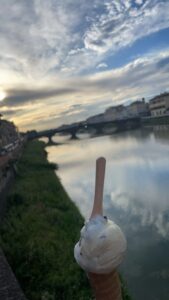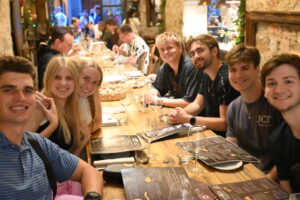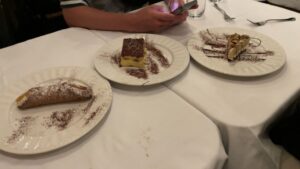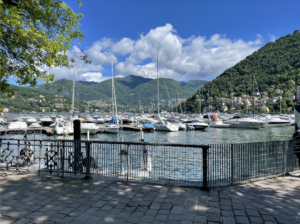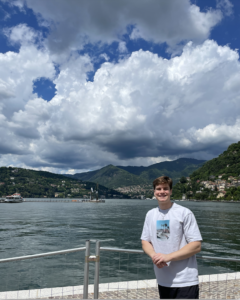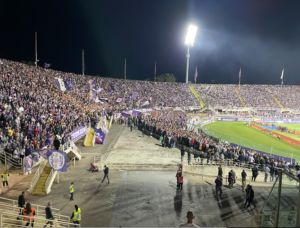After spending two weeks in Italy, I have learned that I am happiest when I am busiest, as the days that I have enjoyed the most are those that seem to end almost as quickly as they began. For example, two of the photos attached with this post are at Lake Como, a location renowned for being the filming location for the Naboo scenes in Star Wars Episode II, which was a day trip that I took with several of the new friends I made on this trip. To no one’s surprise, it was incredibly beautiful and it was one of the few places that I could see myself living at for the long term. To make an important side note: this speaks to a broader lesson I learned in Italy, which was that living abroad is more challenging than I had imagined, from a technical and personal point of view. From the personal side, the longer I stayed in Italy the more I thought about what it would be like if I was not surrounded by friends, SAI (the administration behind a lot of the trip), and the Texas A&M professors who were reminders of home and provided a safety net if any serious issues arose. I was rarely alone during the trip and I was surrounded by fellow students and Americans, which essentially brought the feeling of being at home with me everywhere I went. For instance, the most important connection we shared was the trip itself, which was magnified by the fact that we were A&M students and most of us were from Texas, which allowed us to share personal experiences and talk about how Italy compared to back home, which often made me momentarily forget that I was in another country thousands of miles away from anywhere else I had been in my entire life. As such, when I imagined living abroad on my own, I thought about how difficult it would be to form new relationships and find my way because the only reminder of home I would have would be myself. In a significant way, this thought excites me because it would allow me to test myself and acquire skills and knowledge that I never would have otherwise, but in another way, it is a daunting thought, as I cannot escape the simple truth that there is no place like home.
To further complicate my perspective, I also like the idea of being fully responsible and can imagine feeling more fulfilled by life if I lived abroad long term. For example, I can imagine the feeling of satisfaction and success as I develop competency in another language, learn how to get around, find the best restaurants, and develop connections with people who were once inaccessible to me due to language and location. From a technical point of view, I thought about how much I take the safety net provided for me on this trip for granted and what it would be like if I was injured, became seriously ill, or got lost and did not have an organization that was working 24/7 to provide aid. Perhaps I possess an arrogant level of self-efficacy because I believe that regardless of what happens I can get to the other side of it one way or another, however, I know I am not invulnerable, and challenges can and will arise that I never could have planned for.
All this to say that Lake Como is such an incredible place that I am willing to take on any risk associated with living abroad if it were there. The next thing I want to talk about is the soccer, or ‘fútbol,’ game that we went to. I do not want to say this because I think it sounds like criticism but I also think it is important to what I’ll say next: the professional’s stadium was about the size, cleanliness, and layout of a high school football stadium in Texas. However, the atmosphere could not have been more different. The visitors were boxed off, huge flags were flying, loud firecrackers were popping, alcohol was spilling, and the crowds were louder and more passionate than you might imagine, as there seemed to be nothing more important to them in the world than the game right in front of them. This made me think about the lessons I learned from CQ strategy, particularly with regards to awareness, as during the game I took a step back several times to ask: why was there so much passion, is this unique to this crowd in Florence, and how do they look at sports in the U.S.? My answers to these questions were that at least for this crowd in Florence perhaps the game is very closely tied to their identity and that whichever way it goes speaks to them as a person. Of course, I could be and probably am wrong, but to get a better understanding of these questions it would require more travel around Europe and Italy to see more games.
Attached to this post are several photos of deserts, which I will use to symbolize food overall in Italy as these are what I took most photos of. The main thing I noticed was there was much less variation concerning food options, which was not necessarily a bad thing but it is important for someone traveling in Italy to keep in mind. I mean of course, there are a lot of different types of food in Italy, but it is just different from what I am used to in America. For example, sandwiches are one of the most shining differences because in the U.S. I am used to sandwiches loaded with ham or beef or chicken, etcetera with sauce, onions, lettuce, tomato, etcetera whereas in Italy it was very uncommon to find sandwiches with anything other than pork (prosciutto and prosciutto crudo in particular) and one or two toppings. I found that while I am not the biggest fan of prosciutto by itself, I loved trying it on sandwiches, with cheese, with honey, with pasta, and with pizza, which was not hard to do as prosciutto was found in a significant portion of the meals I ate. This speaks to how exciting it was to make comparisons and draw similarities between the U.S. and Italy, which made me realize how much I value learning through experience, especially when it involves touching, smelling, and tasting.
Lastly, in this short amount of time, I have realized that my cultural intelligence was more limited than I thought but I have loved improving it. For example, I am now more aware of how different places within a country can feel, such as how being in Florence felt much different than being on the Amalfi Coast (perhaps because of the ocean, slightly fewer tourists, and less pronounced antiquity at Amalfi). I also realized that the euro is a stronger currency than the dollar. I learned that more of the world than I thought also drives on the right side of the road, and that making eye contact to signal you are being addressed was much less common in Italy than in the United States, which could just be unique to the people I interacted with. I really could go on, but the main point is that there is no finish line for becoming culturally intelligent and that becoming a global leader requires constant learning and trying to resolve your shortcomings.
